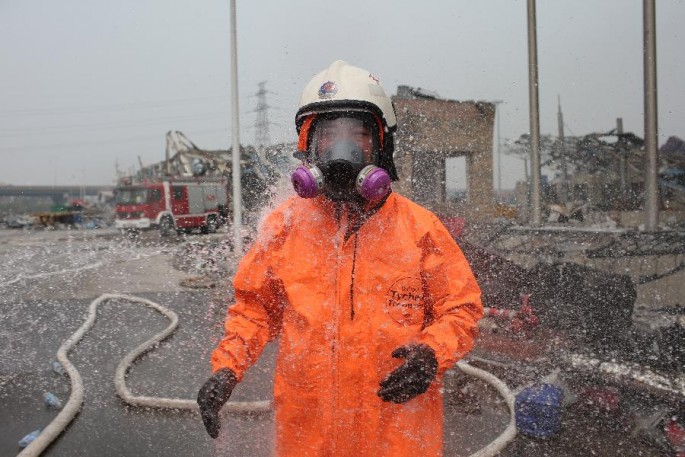The Chinese military has confirmed that several hundred tons of the highly toxic chemical sodium cyanide were stored at the site of the deadly explosions in the northeast port city of Tianjin that left at least 112 people dead and hundreds more injured.
"It's better not to say what the exact location is, but from appearances it can be estimated that it is in the hundreds of tons," Shi Luze, chief of staff of the People's Liberation Army's Beijing Military Region, said at a news conference Sunday.
Shi said that specialists have located two sites where the chemical is stored, adding that the areas where large dispersions have been found will be walled up, while undamaged barrels will be removed from the scene.
Authorities have so far refused to confirm allegation that there was up to 700 tons of sodium cyanide present at the warehouse, which arose from several media reports that the head of Ruihai International Logistics, the owner of the warehouse where the explosions said to have originated, had much of the chemical stored on the site. The company's executives are reported to be in police custody.
More information is gradually emerging from the blasts that shook Tianjin's Binhai Port Area on Wednesday. As of press time, only 24 of the 112 confirmed had been positively identified, with DNA testing being conducted to identify the other 88 bodies recovered. Of the 95 people listed missing as of Sunday morning, 85 are firefighters, suggesting that many of those killed by the blast may have been the first responders to the scene.
The firefighters' attempts to put out the fire with water may have also resulted in chemical reactions that worsened the situation or even triggered subsequent explosions, the Want China Times said in a report on Sunday.
Gao Huaiyou, deputy director of the Tianjin Administration of Work Safety, told the media on Friday that he was unable to provide "an accurate or detailed account of the types or quantities of dangerous goods in the warehouse," noting that several of the containers have not been declared or registered.
According to Want China Times, there were allegedly several dangerous chemicals being stored in two zones at the port. In the packing zone, there was potassium, sodium, sodium chlorate, potassium nitrate, caustic soda, and other hazardous chemicals, while the loading zone housed containers for cyclohexylamine, dimethyl disulfide, formic acid, ammonium nitrate and sodium cyanide.
Sodium cyanide, which appears in white crystalline or granular power form, can be rapidly fatal if inhaled or ingested, as it interferes with the body's ability to process oxygen. It is commonly used in chemical manufacturing, fumigation, and processing precious metals such as silver and gold. When dissolved or burned, it releases highly toxic hydrogen cyanide gas.
The chemical is said to be increasingly popular among Chinese mining firms despite its high toxicity and damage to the environment due to its significant cost-cutting advantages. One executive of Fujian-based Zijin Mining Group, however, defended the practice by telling CCTV that using sodium cyanide to extract gold is the "standard international method."
Some of the dangerous chemicals could have been "smuggled" in as ordinary products and that the practice was not uncommon at some Chinese ports, the Want China Times said, citing industry insiders.
Under Chinese regulations, a small 20-foot container costs 20 yuan ($3.13) per ton of regular goods, while dangerous goods cost 40 yuan ($6.26) per ton. Dangerous goods are charged at twice the amount than regular goods, and can take five to seven days longer for paperwork processing.



























